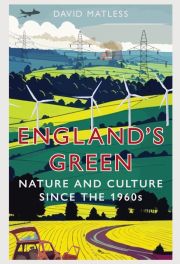England’s Green – Nature and Culture Since the 1960s

David Matless
Reaktion Books, £20.00
England’s ‘Green and Pleasant Land’ has long been treasured. But immediately post WW2, government policy focussed heavily on food production driven by war-time shortages. Sir Arthur Tansley and his colleagues in the British Ecological Society vigorously raised the equivalent importance of conservation and biodiversity, and in the 1930s Tansley wrote The British Islands and Their Vegetation, a seminal work from which he emerged as the founder of the concept of ‘Conservation’ and encouraged its political and social recognition. This resulted in the formation of the Countryside Commission and opening of Monk’s Wood Research Station. Over the next 60 years have come many and various initiatives aimed at caring for the countryside. This culminated in the Agriculture Act of 2020, which laid out a strategic framework for integrating food production, enhancing conservation and conserving ‘England’s Green’.
This book describes how and why conservation and the protection of biodiversity are now recognised as such crucially important aspects of the countryside. The author achieves this with an admirable and erudite mixture of biological facts and, in the widest definition, cultural facets of literature, music and poetry. This is a fully integrated text bringing together these strands which influence how ‘England’s Green’ maybe interpreted and understood.
In eight chapters, Matless explores the meaning of ‘Green England’ in a broad sweep. He has expertly produced a fascinating book that should appeal across disciplines from ecology though to the arts. It is thoroughly readable for both specialists and those with general interests combining the vernacular and factual in a relaxing text. Tansley – who himself combined science, philosophy and psychology – might well have appreciated this book. The sole fault is the use of black and white illustrations; coloured pictures are now easily and cheaply used and would have vividly supported a bold text.
Professor Geoff Dixon FRSB
Reviewed by Professor Geoffrey R Dixon FRSB, Research Fellow in the School of Agriculture, Policy & Development at the University of Reading


